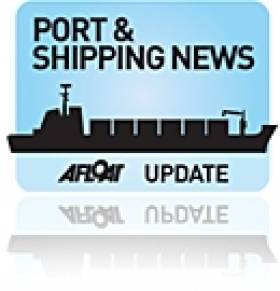Displaying items by tag: MidYear Report
ICG Release Mid-Year Financial Results
#ICGresults – Irish Continental Group (ICG) parent company of Irish Ferries, have released financial report results for the half-year ended 30 June 2014.
Results
The Board of Irish Continental Group plc (ICG) reports that, in the seasonally less profitable first half of the year, the Group recorded revenue of €130.7 million compared with €120.9 million in the same period in 2013, an increase of 8.1%.
Earnings before interest, tax, depreciation and amortisation (EBITDA) were €14.0 million compared with €15.8 million in the same period in 2013.
On a like-for-like basis i.e. excluding the newly introduced vessel 'Epsilon', EBITDA was up €1.2 million on the prior year.
Operating profit was €5.2 million compared with €6.4 million in 2013. Group fuel costs were up €2.5 million (10.5%) to €26.4 million, however when 'Epsilon' (€3.6 million) is excluded, fuel costs decreased by €1.1 million (4.6%) to €22.8 million.
There was a net finance charge of €2.5 million (2013: €3.1 million) which includes a net pension interest cost of €0.7 million (2013: €1.0 million) and net bank interest payable of €1.8 million (2013: €2.1 million).
Profit before tax was €2.7 million compared with €3.3 million in the first half of 2013. The tax charge amounted to €0.3 million (2013: €0.3 million).
Basic EPS was 1.3c compared with 1.6c* in the first half of 2013.
Adjusted EPS (before non-trading items and net pension interest cost) amounted to 1.7c (2013: 2.2c*).* As restated for the 10-for-1 share split (refer to note 2).
Commenting on the results, ICG Chairman John B. McGuckian stated; ''The introduction of the new RoRo ship 'Epsilon' on the Dublin-Holyhead and Dublin-Cherbourg routes has allowed us to grow both our freight and tourism businesses substantially during the year to date".
"I am particularly pleased with the growth in our RoRo freight business, up 20% in volume terms year to date (23 August 2014) while car volumes also remain strong - up 8% year to date (23 August 2014). The increases in both flows of business vindicate our decision to incur the necessary start-up costs in providing this much needed capacity.''
Epsilon: Strong revenue growth, up 8.1%, facilitated by the introduction of the new ro-ro vessel.
- 'Epsilon' drives volume growth in RoRo freight, up 18.5%
- Cars carried up 5.9% in the period
- Net Debt down to €71.9 million from €93.4 million at 31 December 2013
- Interim dividend 3.465 cent, up 5%
- Strong volume growth in summer, in both RoRo freight (up 25%) and cars (up 12%)
- Agreement reached with Pension Trustee on recovery plan
For further information showing all details of ICG's half-yearly financial report, click HERE.
























































